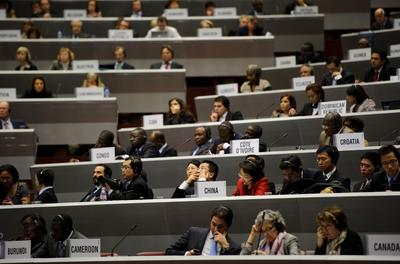The WTO Doha Development Round was launched in 2001 to improve the international trading system by further lowering trade barriers and by revising certain trade rules. Projections suggested that a comprehensive deal would bring world income gains of US$280 billion with notable gains for Asian countries. The ambitious work program made progress until December 2008, when the trade talks stalled over a discord between the United States and India over agriculture. As a reaction, many countries, including some in Asia, chose to sign regional trade agreements to reduce trade barriers and improve trade rules. After two unsuccessful WTO Ministerial Conferences in 2009 and 2011, the meeting in Indonesia, an influential Asian country, represents an important opportunity to bring WTO members back to the negotiation table. In the most optimistic scenario, members will sign several smaller agreements and thereby signal a re-launch of the Doha Round.
In the current negotiations in Geneva to prepare the conference, convergence is apparent around three deliverables.
First, the G20 group of developing countries has made a proposal to change the tariff-quota administration, which would ensure that quotas are distributed in a more transparent way, facilitating market access for quota-restricted products. At present, WTO members have reached consensus on the issue of improving information sharing, but they are still debating how disciplines should be tightened.
The second deliverable is an agreement on trade facilitation, which would accelerate cross-border trade by increasing transparency, harmonising customs procedures and improving trade infrastructure. The main sticking point is how to balance the obligations of developing countries and the assistance granted to them by developed countries. Recently, the IMF, the World Bank and the regional development banks (including the Asian Development Bank), announced that they would cooperate with the WTO to ensure that developing countries would receive assistance to meet the new trade facilitation commitments.
The third deliverable, based on a proposal by the G33 group of developing countries, would allow governments in developing countries to purchase and stock unlimited food at government-set prices for food-security purposes, without being considered as trade-distorting domestic support in contravention of WTO disciplines. The strongest supporters of this proposal are large Asian countries, namely China, India and the Philippines, which all have food security schemes in place for the poor. Currently, WTO members seem to agree on the so-called ‘peace clause’, which would give developing countries a temporary waiver from being challenged under the WTO.
Agreeing on these deliverables will likely improve trade prospects for Asian countries; however, there are some uncertainties.
The first two issues, namely a reform of the quota administration and trade facilitation, should help facilitate trade in Asia. However, only a small fraction of trade in the region is subject to quotas and the agreement would merely make their administration more transparent.
With regards to trade facilitation, several developing Asian countries have already highly efficient customs, as demonstrated for example by the World Bank’s trade Logistics Performance Index 2012. Trade facilitation might therefore be more important for lower-income countries in Asia. The Bali package would help reinforce existing efforts to streamline customs and reduce red tape. The positive effects on trade will probably not materialise immediately but rather in the medium run.
The trade effect of the third deliverable is highly uncertain. Price-setting and food stocking by governments might seriously distort markets. If Asian countries, where food stocks mainly consist of rice, were to apply the newly granted flexibilities, the rice market in the region might become heavily disrupted. Such an outcome would run against the idea of creating a more open, stable and predictable trading environment.
Even if the trade effects of the three deliverables might be small, agreeing on a small package in Bali would provide a strong incentive to resume negotiations of key parts of the Doha Development Agenda. The risk remains high, however, that no agreements will be reached. So-called mega-regional trade agreements under negotiation by key WTO members, such as the Trans-Pacific Partnership or the Transatlantic Trade and Investment Partnership, reflect the skepticism felt toward completing the Doha Round.
Matthias Helble is Research Fellow and Ganeshan Wignaraja is Director of Research at the Asian Development Bank Institute.

